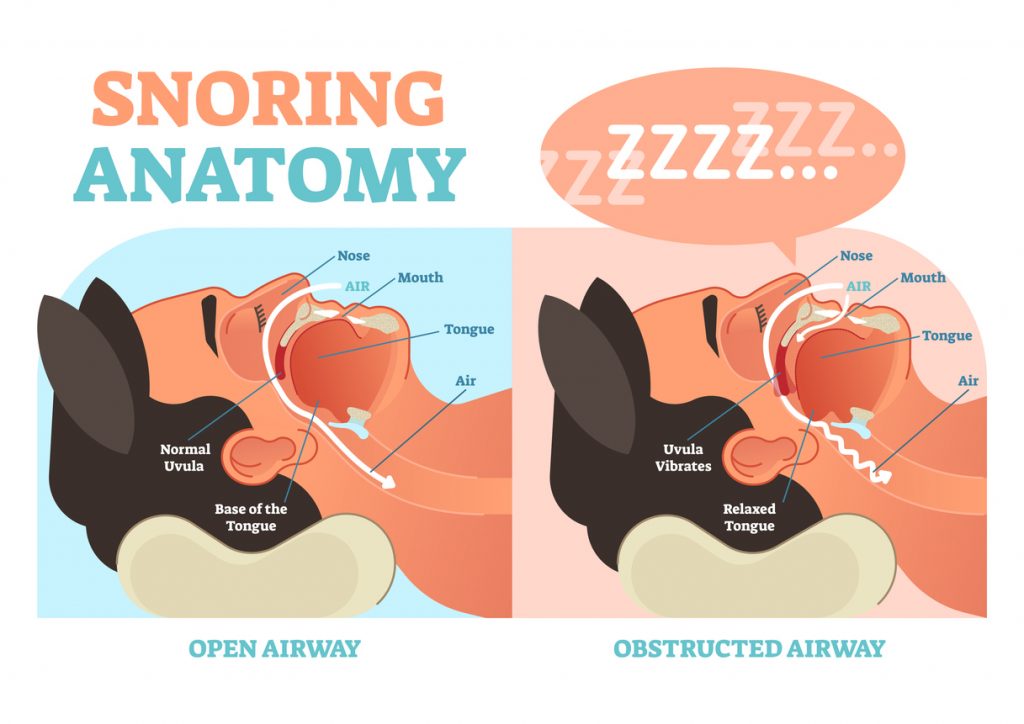The Buzz about Snoring: Unraveling the Mysteries, Risks, and Solutions
Snoring, that familiar nighttime symphony, is something many of us have encountered either as the snorer or the unfortunate listener. While often dismissed as a minor annoyance, snoring can be a symptom of underlying health issues. In this post, we’ll talk about the anatomy of snoring, its potential implications for health, when to be concerned, and effective strategies to put a stop to the nocturnal noise.
The Anatomy of Snoring:
Snoring is the result of the vibration of tissues in the throat and nasal passages during sleep. The process starts when the flow of air through the mouth and nose is partially blocked. As we breathe in and out, the relaxed tissues vibrate, producing the familiar sound we associate with snoring.

Several factors contribute to snoring, including:
Muscle Tone: Weakness in the throat and tongue muscles can allow the airway to collapse, leading to snoring.
Nasal Issues: Congestion or nasal deformities can impede airflow, causing turbulence and snoring.
Sleep Position: Sleeping on your back can make the base of your tongue and soft palate collapse to the back wall of your throat, increasing the likelihood of snoring.
Obesity: Excess weight, especially around the neck, can put pressure on the airway, contributing to snoring.
What Snoring Means for Your Health:
While occasional snoring is usually harmless, chronic snoring can be a sign of an underlying health issue, such as:
Obstructive Sleep Apnea (OSA): This is a serious condition where the airway becomes completely blocked, leading to interrupted breathing during sleep. OSA is associated with a range of health problems, including cardiovascular issues, diabetes, and daytime fatigue.
Cardiovascular Risks: Chronic snoring has been linked to an increased risk of heart disease and stroke. The constant vibration and intermittent lack of oxygen during sleep can strain the cardiovascular system.
When to Be Concerned:
Not all snoring requires medical attention, but certain signs may indicate a more serious problem:
Loud and Disruptive Snoring: If your snoring is loud enough to disturb your sleep or that of your partner, it may be worth investigating further.
Daytime Fatigue: Excessive daytime sleepiness can be a sign of sleep disorders like sleep apnea.
Gasping or Choking: If you notice pauses in breathing followed by gasps or choking sounds, it could be indicative of sleep apnea.
High Blood Pressure: Persistent snoring, especially when accompanied by other risk factors, may contribute to elevated blood pressure.
Ways to Stop Snoring:
The good news is that there are various strategies to address snoring, ranging from lifestyle changes to medical interventions:
Lifestyle Modifications: Losing excess weight can reduce pressure on the airway. Sleeping on your side may help prevent the collapse of the airway. Avoid alcohol and sedatives. These substances can relax the muscles in the throat, contributing to snoring.
Nasal Strips and Sprays: Nasal strips can help to open nasal passages, allowing for smoother airflow. Nasal sprays can also reduce congestion and improve breathing.
Oral Appliances: A sleep dentist like Dr. Postol can provide custom-made devices that reposition the lower jaw and tongue to keep the airway open.
Continuous Positive Airway Pressure (CPAP): This is a common treatment for obstructive sleep apnea. A CPAP machine delivers a constant stream of air, preventing airway collapse.
Surgical Interventions: In severe cases, surgical options such as uvulopalatopharyngoplasty (UPPP) or genioglossus advancement (GA) may be considered.
Now You Know
Snoring is more than just a nightly nuisance—it can be a potential indicator of underlying health issues. Understanding the anatomy of snoring, recognizing its implications for health, and knowing when to seek help are crucial steps in promoting overall well-being.
Whether through lifestyle changes, devices, or medical interventions, there are effective ways to address snoring and ensure restful, silent nights for both the snorer and their sleeping partner. If you or someone you know is experiencing chronic snoring with concerning symptoms, consulting with a healthcare professional is the first step toward a healthier and quieter sleep. Contact us to schedule an appointment today!
